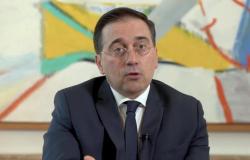After the death of César Moreno in the Bouwer prison was made public and the prosecutor José Mana accused nine members of the Córdoba Penitentiary Service (SPC) and several requests for report from the opposition, this Wednesday the Security Commission of the Legislature of Córdoba was established to specifically address the situation of those detained in Córdoba.
It was a commission meeting behind closed doors in the offices of the provincial Ministry of Justice and Labor, which generated the anger of some opposition legislators for not forming the legislative body in the same Legislature. More than 20 parliamentarians participated in this commission, the Secretary of Penitentiary Organization and Management, Gustavo Vidal Lascano; and the minister of the area, Julián López, as well as authorities from the Penitentiary Service.
The commission was chaired by the head of Security of the Unicameral, the legislator and vice president of the legislative body, Nadia Fernández; and its main axes were the Moreno case, which led to the indictment of a director, seven guards, a psychiatric doctor and another health professional, in addition to the situation of system intervention.
Juan María Bouvier, then head of the Córdoba Penitentiary Service, has been imprisoned since last December in the context of the irregularities being investigated in the “Bouwer Case.” The “master” of the Córdoba prisons, as he was called, spent 15 years at the head of the SPC.
After the meeting, Fernández confided that it was an instance of dialogue on issues “related to the reorganization process of the Penitentiary Service undertaken by the provincial government in recent months,” in which legislators could clear up their concerns.
“Insecurity is one of the problems that most worries the people of Córdoba. And in this context, what happens in our prisons is also a matter of analysis when designing public policies to combat this scourge that is worsening with the crisis that the country is experiencing. The people of Cordoba need the three powers of the State: Executive, Legislative and Judicial working together and in an articulated manner. And this meeting was a reflection of this vocation for dialogue and joint work among all of us who have management responsibility,” said Fernández, who carried out the meeting between legislators and officials.
“All those legislators interested in knowing the status of the issue were invited. Vidal Lascano was previously informed of all the report requests and a general state of the situation was given about the interventions that were made in the penitentiary system since the intervention, that is, since Bouvier’s departure,” they confided from the ruling party.
Alejandra Ferrero, president of the Together for Change interblock, explained that there was an express request for officials to attend the venue, in addition to specific proposals about the system. “Due to the death of Moreno, who had a psychiatric history, we made requests for this, evidently they are trying to organize the catastrophe they have, they could not give explanations regarding the prison overpopulation, the overcrowding, the training of the Penitentiary Service personnel due to the numerous cases of institutional violence,” Ferrero summarized. “We attended the meeting, but we made it clear to them that they did not respond to the report requests and that there are summonses for them to attend the Legislature,” the radical insisted.
Legislator Ariela Szpanin expressed along the same lines, who highlighted that emphasis was placed on medical care as well as the provision of emergency and mental health services.
Gregorio Hernández Maqueda, legislator of the Civic Coalition and author of one of the requests for a summons to Minister López, highlighted the concern about the number of unconvicted prisoners and the training. “They acknowledged to me that there are 70 percent in preventive detention, and we told them that officials must attend the commissions. It also allowed us to know the number of prisoners without conviction, which is worrying,” said the opposition legislator.






